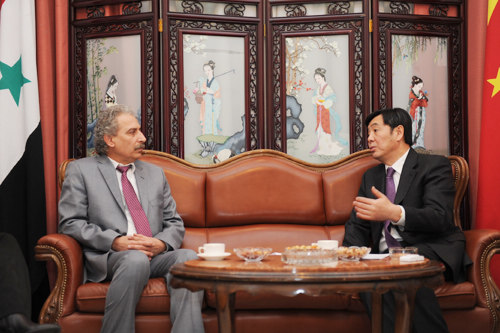|
 |
|
DIALOGUE: China's Vice Foreign Minister Zhai Jun (right), a special envoy of the Chinese Government, exchanges views with Loai Hussain, leader of the opposition Building Syria State Party, in Damascus on February 18 (QIN HAISHI) |
Despite being a veto-wielding permanent member of the UN Security Council, China has used its privilege sparingly. Over the past four decades, it has cast only eight vetoes, fewer than any other permanent member of the Security Council.
The most recent one came on February 4 when the nation vetoed a draft resolution put forward by the Arab League urging Syrian President Bashar al-Assad to hand over power. And 12 days later at the UN General Assembly, it voted against a non-binding resolution calling for political transition in the conflict-ridden country.
Analysts point out China's attitude toward the Syrian issue shows the country is assuming more responsibilities and obligations in international affairs. Actions of the international community and the UN on the issue of Syria should help ease tensions, facilitate political dialogue and resolve differences instead of complicating the issue, they say. They believe China did what a responsible country should do—it didn't follow suit or keep silent, but took concrete steps to address the crisis in keeping with the UN Charter.
"Maintaining regional and world peace is a fundamental principle in China's foreign policy," said Qu Xing, President of the China Institute of International Studies (CIIS). "We oppose interference in a country's internal affairs or regime change through the use of force. We don't believe that sanctions or the threat of sanctions is helpful to achieve an appropriate solution. We don't want to see some countries take advantage of UN resolutions as an excuse for launching a war. That's why China said no."
On February 16, after China and Russia vetoed a proposed resolution on Syria, which has been plagued by an 11-month political crisis, at the UN Security Council, a similar resolution was passed at the UN General Assembly.
The resolution, drawn up by Saudi Arabia and introduced to the General Assembly by Egypt, was adopted with a vote of 137-12 with 17 abstentions. Though non-binding, the resolution aims to put more pressure on the Syrian Government.
Despite its adoption by an overwhelming majority with only a dozen countries, including China and Russia, voting against it, the vote count might not fully reflect the essence of the issue, said Ruan Zongze, Vice President of the CIIS.
"The West has been dominant in the international community. Many small and medium-sized countries are often influenced by the West when they cast their votes on international affairs. Therefore, China's negative vote was significant for safeguarding the fundamental interests of the Syrian people," said Ruan.
Though they voted in favor of the resolution, many countries showed the same concerns about Syria as China. Explaining their votes at the General Assembly, representatives of Grenada, Serbia, India, Bangladesh, Singapore and others underlined the importance of respecting Syria's sovereignty, unity and territorial integrity and opposing outside interference.
| 